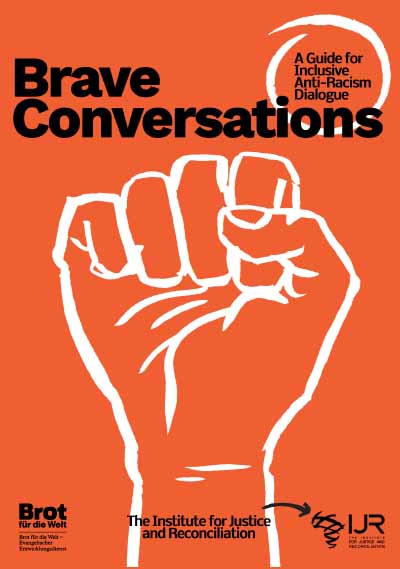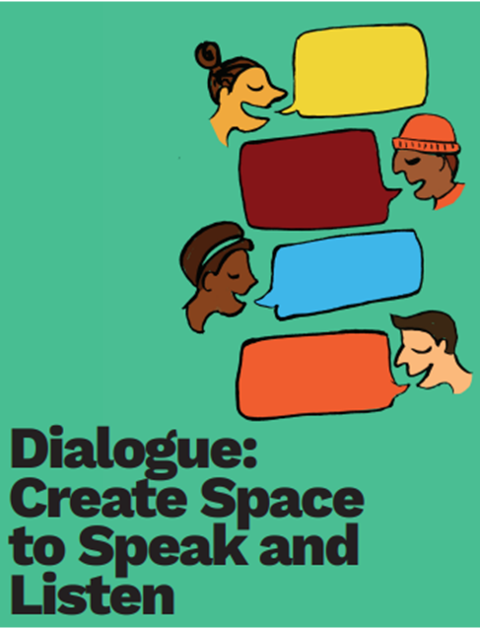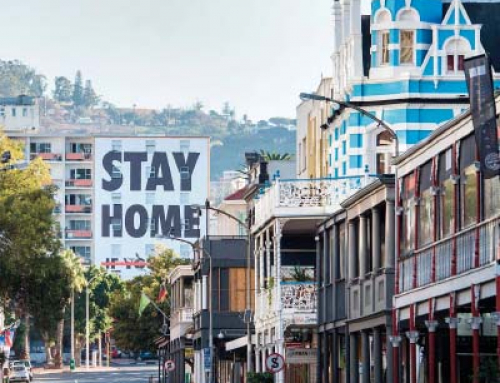
Brave Conversations: A Guide for Inclusive Anti-Racism Dialogue
Publication Summary:
This guide is aimed at empowering readers with the knowledge, insights, and tools to engage in dialogue on racism. Developed with the South African context in mind, this toolkit brings together the collective wisdom of IJR dialogue participants, dialogue facilitators and IJR colleagues who create and hold space for empowering conversations and healing. This publication aims to inspire critical conversation around racism within a post-Apartheid South African context.
Background:
The Institute for Justice and Reconciliation (IJR) was launched in the year 2000, in the wake of South Africa’s Truth and Reconciliation Commission. The aim was to ensure that the lessons learnt from South Africa’s transition from apartheid to democracy were taken into account as the nation moved ahead. Today, the institute helps to build fair, inclusive and democratic societies through carefully selected engagements and interventions.
The Anti-Racism Project (ARP) of the IJR, launched in 2018 strives to challenge the systemic, institutional and identity manifestations of racism in South Africa, through research, community engagements and ongoing dialogues. This journey is coupled with the use of communication strategies and tactics to ensure that the in-depth work of the project reaches wider audiences, and broadly unpacks the complex nature of racism.
IJR, through its community healing dialogues, has held space for difficult conversations for many years. Drawing on this experience, it explored the process of facilitating anti-racism dialogues as a way to surface the intersectionality of race, class, gender, ethnicities, histories and religion. These dialogues offered a safer space for unpacking the complex and often painful manifestations and lived experiences of racism in South African communities.
Alongside various communities of interest, the project explored the lived reality of race and racism in South African communities. This culminated in a series of dialogues where experiences of race were explored and unpacked.
This toolkit is a resource for those committed to combating racism and offers guidance on how to hold space for dialogue race and racism. Whether you are a facilitator or reading for interest, we hope that this resource is a contribution to ongoing conversations around how we understand racism, how it manifests in society and what the effects are. Furthermore, this resource serves as a learning tool and guide on how to conduct brave conversations about racism and racial injustice. This resource intends to contribute to shifting narratives, to encourage deeper reflection and to transform attitudes for the creation of new ways of seeing one another and new ways of being.
How to use this guide?
This guide is meant to support persons who are committed to combatting racism, by offering guidance on how to hold space for informal and formal dialogues and for suggesting further reflection on anti-racism. This guide can be used to reflect on the necessary personal work we all need to do to better to combat racism in our spheres of influence. It offers practical tools for effective listening and for taking action to confront racism and proposes dialogue as a process for creating spaces for conversation toward deepening understanding and strengthening relationships across difference.
By: IJR’s Anti-Racism Project
Pages: 19
Dimensions: A4
Date of publication: 2021
Publication Highlights

This toolkit is dedicated to the late Stanley (Stan) Henkeman, who was the Executive Director of the Institute for Justice and Reconciliation (IJR) at the time of his passing (18 December 2020). Stan was a champion of social justice and anti-racism work. He initiated the Anti-Racism Project at the IJR and made a great contribution to this toolkit. He was also one of the founding members of ARNSA (Anti-Racism Network of South Africa). We hope to continue his legacy of pursuing justice and reconciliation in South Africa and the world.

This toolkit breaks down some basic concepts with which to navigate the complex terrain of holding space for difficult conversations. Language has power and words hold meaning. It informs and shapes the way in which we engage with the world and reflects our understanding thereof. In order to enhance the quality of dialogue and discourse on race, it is important that we start from a place of some degree of shared understanding of the terms and concepts that have the power to either engage and support antiracism work or incite and divide.

This publication highlights the long history of violence, oppression and inequality in South Africa and encourages utmost sensitivity to the ways in which the past continues to shape the present. This is a critical component of not only good process facilitation but also a key consideration when talking about race or addressing racism. This publication is useful for individuals embarking on hosting social justice related dialogues in South Africa. Dialogue is the process of sharing of peoples’ different perspectives on an issue or topic with the aim of gaining understanding and strengthening relationships. This guide contains a number of dialogue activities and tools to assist in the facilitation of difficult conversations and dialogues about racism.

This guide shares practical ways in which to challenge and confront racism in schools, workplaces and communities. It also reflects on the ways in which race intersects with gender, class, culture, language, nationality etc and showcases the importance of an intersectional approach to anti-racism work.
It provides tangible examples as to how to challenge racist thinking and reject societal norms that perpetuate racism, in policy and practice. This includes advocating for structural and institutional change at a local level (communities) and at a policy (government) level. This guide maintains that the current norms and systems have to be dismantled and decolonised for the goal of socioeconomic justice and social equity.

This guide shares useful ways to practice anti-racism in your everyday life. Anti-racism work is a life-long commitment and process. To be anti-racist means to embrace and practice a culture of zero tolerance for racist beliefs, attitudes, behaviours, policies and systems. To be anti-racist means to actively work towards dismantling racism within society. This guide zooms in on practical tips or takeaways to help you practice anti-racism in your everyday life including how to support communities that face racism daily.




